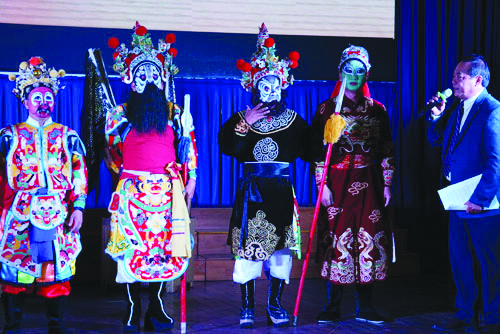 Life & Style
Life & Style

The Government must have a special regime for traditional art forms and no longer ask for certain qualifications when it recruits artists in the field of traditional arts, experts have said.

|
| The HCM City Theatre of hát bội is in serious need of young, professional artists. — Photo courtesy of nld.com.vn |
HCM CITY — The Government must have a special regime for traditional art forms and no longer ask for certain qualifications when it recruits artists in the field of traditional arts, experts have said.
The HCM City Theatre of hát bội (classical Vietnamese opera) and other art theatres are in serious need of young artists who can pursue the profession.
Traditional art forms are at a disadvantage because they target niche audiences, while other forms of entertainment can bloom.
About four young artists who currently work in the city's hát bội theatre cannot apply to become official staff at the theatre due to a lack of prescribed qualifications.
According to Người Lao Động (Labourer) newspaper, artists in cải lương (reformed theatre), chèo (a form of satirical musical theatre, often encompassing dance, and traditionally performed by Vietnamese peasants in northern Việt Nam) and bóng rỗi (a dance and singing art form performed at mother goddess worship rituals in southern Việt Nam) have experienced similar issues.
This has created anxiety among many artists who have been pursuing the profession for a long time, including Meritorious Artist Trọng Phúc from Trần Hữu Trang Cải Lương Theatre.
Even though he has won many medals at professional cải lương competitions, he has not been recognised as an official, permanent staff of the theatre.
Meanwhile, People’s Artist Trần Ngọc Giàu, who is president of the HCM City Theatre Association, said that new regulations require artists to be an official staff in order to have a salary evaluation.
“If an artist is not on the list of official staff, a theatre has to pay them from the off-budget revenue. The preservation of traditional art intertwined with rigid regulations has posed a serious barrier to the formation of future traditional art performers,” he said.
For decades, many young artists have been trained from a very young age by experienced performers. Young artists cannot simply wait until 18 years old to enter specialised art schools, then take another four years studying, because many young artists can become main artists at the age of 15 or 16.
“The HCM City University of Theatre and Cinema does not have a major in hát bội because no one is currently pursuing this form of art. So it is impossible to have a degree in this classical opera genre,” director Lê Diễn, director of Phương Nam Art Theatre, said.
He added that "the Government must have a special regime to encourage young artists to stay in the field".
Talent hunt
Experts said that the traditional art of bóng rỗi singing and dancing is on the edge of extinction. Although it is a part of worship ceremony in the South, this ritual practice has attracted the public’s attention due to its spiritual and entertainment values.
Bóng rỗi artist Lý Thị Năm from Tiền Giang Province said that she started her career at the age of eight and learned bóng rỗi art genre from seven teachers.
“I know some young talents who love this traditional form of art but the low income has discouraged them from pursuing the performing career professionally,” Năm said.
People’s Artist Trần Minh Ngọc said it is important to invest in human resources for these traditional drama forms before they become extinct.
Director Lê Diễn added that relevant authorities need to hunt for and discover new talents, even in remote areas.
Preservation of the traditional art forms must be a priority, experts said. - VNS